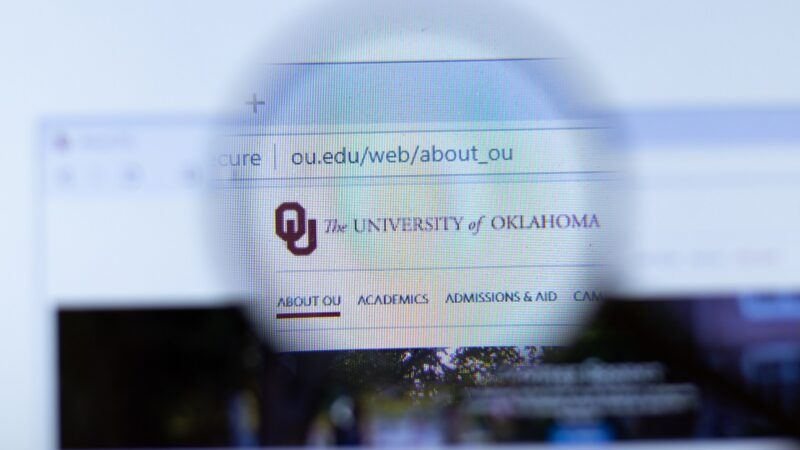University of Oklahoma Diversity Training Forces Students and Faculty To Affirm the School's Political Views
The mandatory online training requires users to select the “right” speech before they finish.

After a summer of racial reckoning, the University of Oklahoma instituted mandatory diversity training for students and faculty last fall. According to the OU website, the program addresses power, privilege, and identity as "one element of OU's efforts to promote systemic change." In the announcement, President Joseph Harroz Jr. said, "We simply cannot reach our full potential unless we become a true place of belonging where every member of the OU family feels seen, heard, and valued."
But, for graduate student and staff member Elizabeth Owen, the training had quite the opposite effect.
In order to participate in the 2020–2021 school year, Owen was required to complete three interactive video-based training programs depicting scenarios that a community member might encounter on campus. Participants were presented with several choices of how to respond, and their selections drove the video's storyline.
While many schools require diversity training, OU's rendition clearly violates First Amendment rights. The problem is that each module restarted until participants selected the "right" answer, forcing an expression of agreement with university-approved viewpoints in order to complete the mandatory training.
The videos depicted politically contentious situations. In one, a fictional co-worker Michael complains, "I'm so tired of all this transgender stuff." Participants then chose from three responses: "Wow, that's incredibly intolerant of you," "I agree. Political correctness can be so tiring," or "You seem upset. What's the matter?"
Owen selected the second option, which resonated most with her. The video continued and Michael said, "Right. Like who appointed the language police around here?" Then it restarted, forcing her to select the university-approved response of "You seem upset. What's the matter?" to continue.
Forced by OU to act against her conscience on this question and others, Owen contacted the Foundation for Individual Rights in Education (FIRE), which looked into the matter as a potential First Amendment violation. In an interview, FIRE attorney Adam Steinbaugh told me: "The First Amendment deals not just with the right to speak. It also prevents the government from compelling you to voice opinions that you don't agree with."
In November, FIRE sent OU a letter on Owen's behalf, demanding the university make affirmations optional: "By requiring students and faculty to affirm that their personal views align with those of the university, without providing avenues for expressing dissenting viewpoints, OU violates the freedom of conscience of its community members and, by compelling certain speech, violates the university's obligations under the First Amendment."
FIRE also requested that OU provide all training materials for review as required by the Oklahoma Open Records Act. The letter concludes, "FIRE calls on OU to commit to protecting the freedom of conscience of its students and faculty members."
In March, months later, an open records manager from OU responded, indicating that the videos are provided by a third party service, Everfi, that holds the copyright to all training materials: "OU will allow you to view the Module, for public purposes only, on the Norman Campus during regular business hours." Because FIRE is located in Philadelphia, this would require an attorney to fly across the country. Ultimately, though, Owen was able to retrieve the materials herself.
According to FIRE Program Analyst Sabrina Conza, the precedent for compelled speech stretches back to a 1943 decision in West Virginia State Board of Education v. Barnette, when the court deemed it unconstitutional to compel schoolchildren to salute the American flag, maintaining that true patriotism is born of free thought, not coercion.
In the decision, Justice Robert H. Jackson wrote, "If there is any fixed star in our constitutional constellation, it is that no official, high or petty, can prescribe what shall be orthodox in politics, nationalism, religion, or other matters of opinion."
Similar instances of public universities compelling speech are popping up across the country. At Shawnee State University in Ohio, philosophy professor Nicholas Meriwether filed a First Amendment lawsuit against the university after he was disciplined for refusing to use a student's preferred pronouns, which Meriwether said would have been in conflict with his own Christian beliefs. Last month, the U.S. Court of Appeals for the 6th Circuit court ruled the case can go forward.
While the impositions of left-leaning university administrators on free speech seem to get the most attention, threats to free speech come from both sides of the aisle. As Steinbaugh put it, "The threat to free speech on institutions comes from all ideological corners. There is consistent pressure on institutions to censor students and faculty whose speech others find offensive."
A recent controversy at East Tennessee State University demonstrates just that. At a February game, the men's basketball team kneeled during the national anthem in protest of racial inequality. In response, every Tennessee Republican state senator signed a letter calling on university presidents and chancellors "to adopt policies within [their] respective athletic departments to prohibit any such actions moving forward," with blatant disregard for the student-athletes' rights to free speech and the Barnette precedent.
Amid widespread threats to the First Amendment, Steinbaugh warns, "People will stand up for the free speech rights of their allies, but they won't do it for the rights of people they disagree with. It's easy to say I respect free speech, and I love free speech in the abstract, but it can become a lot harder for many people to defend those rights when it's someone else's ox that's being gored."
The mounting crackdown on free speech in academia demands general outrage, yet most stay silent until they see their own principles under attack. But true free speech advocacy is not reactionary. Rather, it requires that one put aside his own convictions in defense of universal intellectual autonomy.


Show Comments (98)